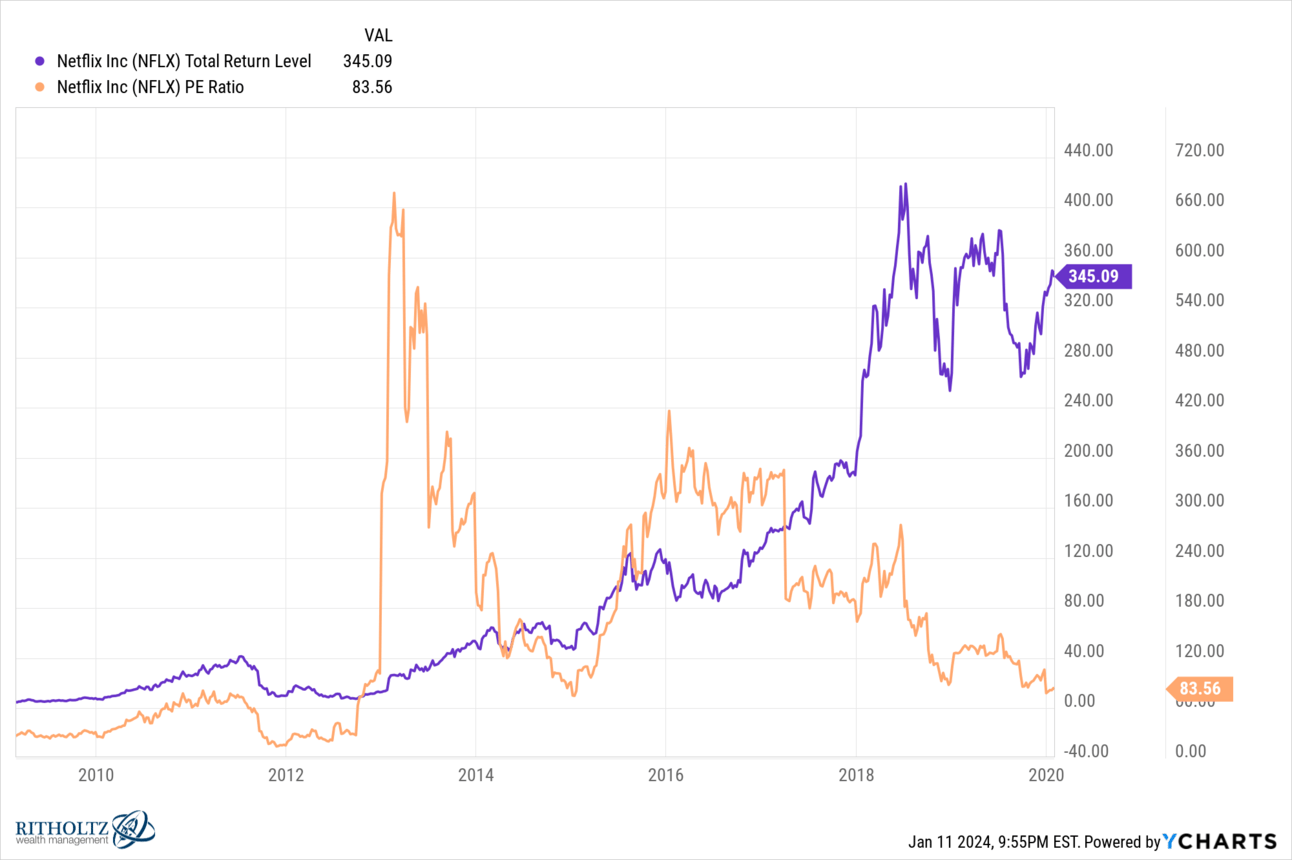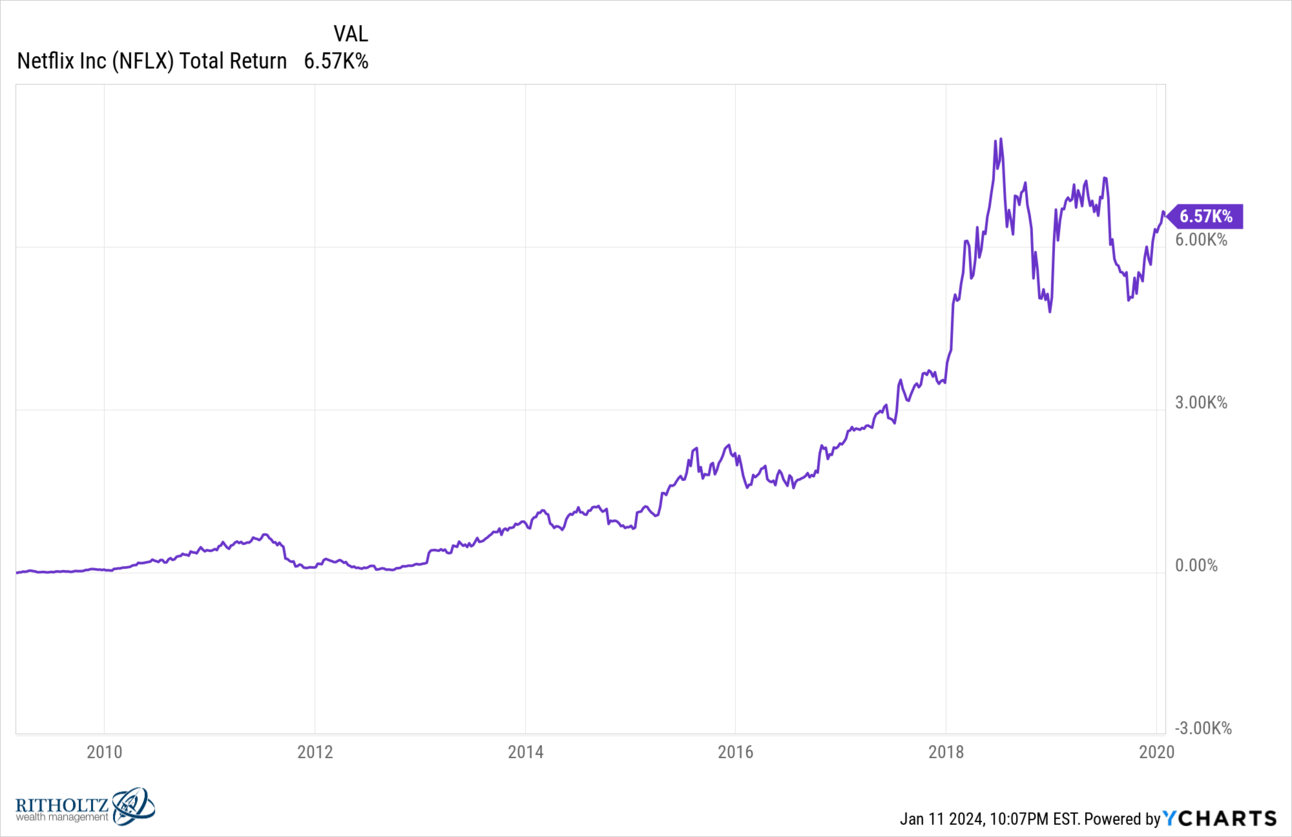Netflix traded at an average price-earnings ratio of 165x from March of 2009 when the bear market bottomed through January 2020 and the onset of the pandemic.
Not 16.5x. One hundred and sixty five times earnings. And remember, that’s an average, so half the time during that eleven year stretch, it was even higher than that.
And do you know what else happened during this period of time? The stock went up. It went up a f***ing lot. Every thousand dollars you put into Netflix became $66,000 by the end of this period. That’s not a typo. The stock went up 6,570%.
See for yourself. The first chart is the stock price versus the PE ratio. The second chart is percentage return.


Oh, Netflix as of this writing is actually closer to $500 now. It’s up even more.
It was never cheap. It was never even reasonable. During that entire stretch, there was never, ever even a single second during which the stock was “a good buy” based on this metric. And yet, it became one of the biggest winners of all time.
But, according to the text books and that elderly gentleman in the bowtie, you’re not supposed to be rewarded for buying stocks trading at 200x earnings! That’s true. But it’s never that simple. Rules of thumb and formulas do not always capture the thing that matters most and, in this case, it wasn’t PE ratio.
So, if not the earnings multiple, what were the bulls who made all that money paying attention to instead?
Maybe - and I know this is crazy - they were following the actual fundamentals of the business. The transformation of the entire way a billion people receive their media and entertainment in over a hundred countries. A complete, top-to-bottom remaking of Hollywood’s economics. The content itself and its cultural impact - again, at home and around the world. An explosion in paying customers. A snowball of recurring revenue rolling down the mountain. An insurmountable strategic advantage and technological edge. These were the things worth paying attention to. They didn’t excuse the valuation, they explained it.
The people who earned that 6,500% return were focused on what was going on away from the current profitability. They were looking at the big picture. And in the big picture, streaming became a winner-take-all business. You had to get scale on both content and users and you had to do it before anyone else could. This was a money-losing strategy until it wasn’t. Now, and to this day, Netflix has earned more than 100% of all the profits ever generated by streaming. Which means everyone else - yes, including Disney - has been losing money. The only profitable streaming service in 2024 is Netflix and that’s because they didn’t focus on profitability in 2014. The bulls understood the need for spending big and they rewarded Netflix shares when that spending was translating into more paying users, not earnings per share.
The profits would come. You had to understand the rationale for them not materializing yet. You had to bet that they would.
And they did.
Over the last four quarters, Netflix has done over $10 per share in earnings on almost $33 billion in revenue. While traditional Hollywood players focused on earnings per share each quarter, Netflix came along and ate their lunch. The most prestigious film studios and television networks in the world currently look like penny stocks in comparison.
This is easy to document now, from the future, but it was not clear that things would play out this way back in 2009, 2010, 2011, 2012…but the people who saw it coming didn’t spend even a second on the multiple to earnings. To their credit, they figured out the ending first and then worked backwards to a decision to buy the stock in anticipation of that ending. The ending was a happy one.
But, but, but!
Now, I have been around for a long time and I already know that 3% of the people reading this are preparing to fire a reply back to me “OH, SO YOU’RE SAYING VALUATION AND EARNINGS DON’T MATTER, JOSH?” or they’re going to teach me something about the Dot Com Bubble as though I didn’t already live and trade through it or they’re going to quote-tweet my post and be like “this feels toppy” or “it’s different this time” or whatever snarky bullshit they use to cope with having sat this rally out.
I have seen a million of these replies and quote-tweets about my writing and speaking over the last fifteen years. Thousands of “oh yeah’s” and “actually’s” and “however’s”. I started blogging at Dow 7,000. We’re at Dow 37,000. It’s newer, younger reply guys these days but they always say the same four or five cliche’d comments.
Knowing full well that these replies would be coming, I decided to hit publish anyway. What does that tell you?
Man on Fire
I bring this story about Netflix up because it’s a perfect illustration of how important it is to think differently than the traditional analysts do during a time of mass disruption. Easier said than done. To go out on a limb takes courage and conviction and most folks just don’t have it in large supply. The more professionally ensconced you are on Wall Street, the harder it is to break away and say something unconventional. You can’t afford to look crazy. You can’t risk being laughed out of the room. Your kids are enrolled in a Manhattan private school and your wife or husband is relying on your mid-six figure sell-side analyst base pay. Don’t f*** it all up by saying Tesla will be valued like a software company and become a lower-cost manufacturer of cars than Detroit. Or Apple’s iOS store could be worth a trillion dollars. Definitely don’t be saying crazy shit like that at work. It simply isn’t done.
In 2014, those would have been considered insane statements. In 2024, they’re demonstrably true and now accepted as common knowledge.

Dan Ives (center) with Michael and I at Ritholtz Wealth Management headquarters
But saying things like that, again and again, is precisely what Dan Ives has done for pretty much his entire career. Decades of contrarian thinking. Sometimes he’s been wrong and sometimes he’s been so ahead of his time that he only looked wrong for awhile on his way to looking amazingly right. Dan’s been pounding the table on Microsoft, Apple, Tesla and the rest of the Magnificent 7 since before we were calling them that. He’s been way out of consensus, but that’s only because consensus simply hadn’t yet caught up to his prescience.
So how did he do it? How did he see it? One thing is for damn sure - he wasn’t drilling down on PE ratios as billion dollar companies became trillion dollar companies over the last ten years. I’ll let him tell you the rest of the story himself.
Our guest on The Compound and Friends today is none other than Dan Ives, Managing Director and Senior Equity Research Analyst at Wedbush.
Dan blew into our Bryant Park headquarters last night like a man on fire. Fresh off a flight from the Consumer Electronics Show in Las Vegas, attended by over 130,000 people from around the world. If you’re following Dan on Twitter or LinkedIn, you’re seeing him having the time of his life. All of the AI, cloud computing, machine learning, virtual reality and enterprise software stuff he’s been talking about is finally becoming apparent to the rest of us. It’s the wave and he’s been paddling out in front of it while Wall Street is still pulling its trunks on.

He is the man for the moment.
Please listen here on your favorite podcast app. The video will be up by the end of the day Friday on The Compound’s YouTube channel.
Thanks for listening. If you love the show, tell everyone by leaving a rating and review on Apple or Spotify. Talk soon! - Josh


